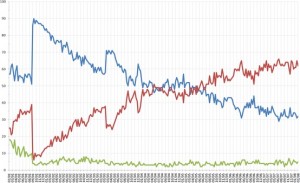Let’s suppose you’re a city manager responsible for serving residents and companies in your beloved hometown. These folks are the lifeblood of any community, and it’s your job to keep them happy.
Yet, all they hear about is how terrible your city is. Certain groups loudly complain about underfunding of your parks and bike paths. Other groups scream about the lack of resources being allocated to at-risk youth programs. Still other groups are mobilized against the tax breaks being offered to corporations considering relocating to your area. It’s unfair. . . unconscionable. . . an outrage!
What do you do?
As difficult as it might seem, you ignore the highly-orchestrated hysterics of the political activists and seek a dialogue with the vast majority of residents and potential residents who are focused on their daily lives and not engaged in the life-and-death struggle for public resources.
The surprising fact is that the majority of citizens who constitute the backbone on any community typically neither love nor hate it. They are rational people who recognize that reality lies between the extremes. They’re turned off by the rhetoric and confusion, not by your city.
Unfortunately, their silence doesn’t drown out the apoplectic cries of the highly publicized “victims.”
This is the apathy versus the hate equation. You might think that most people “hate” you and your city. They hate everything you’re doing, and hate everything you stand for.
Nothing could be further from the truth.
But the sad part, is not that people hate you, but that most people don’t seem to care.
On the one hand, you’ve got a super loud, but small group of people. On the other, you’ve got a very quiet, very large group of people who are very detached from what you do.
And that is the group you need to hear from, because they’re the ones who will ultimately help you find the best choice for your city.
As researchers, we are often called on to help city managers learn the opinion of the majority of their city’s population. They want to learn what the majority really wants, rather than ignoring them in favor of those loud few.
That’s why you as a city manager needs to understand the important — very important — difference between hate/anger and apathy from your constituents. One is louder, but the other is more powerful.
Because if you end up angering the apathetic group, they’ll remember it come Election Day.
Check back for our next post, as we discuss some of the different scientific research methods city managers can use to learn the true will of the people in making the best decisions.





